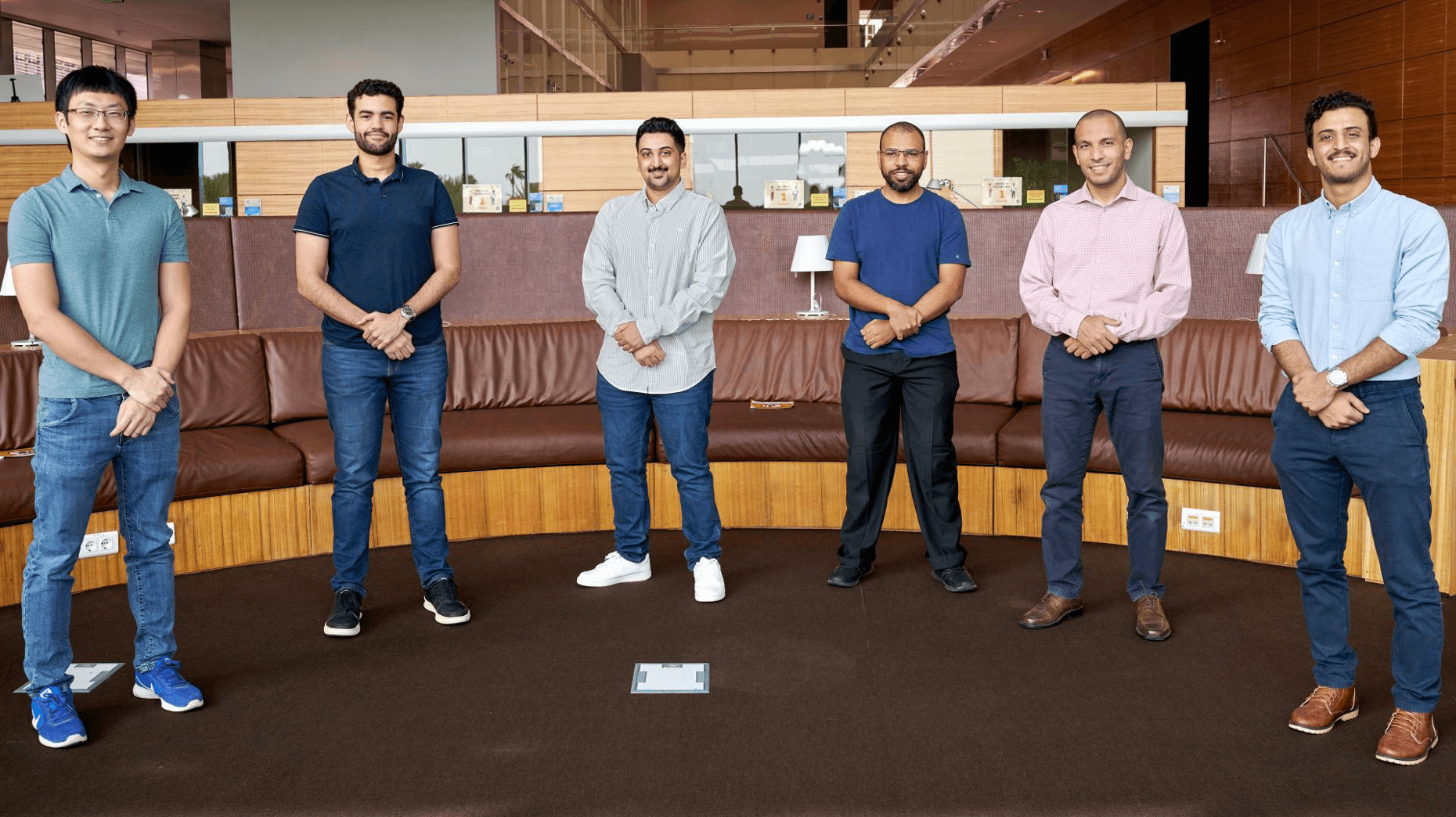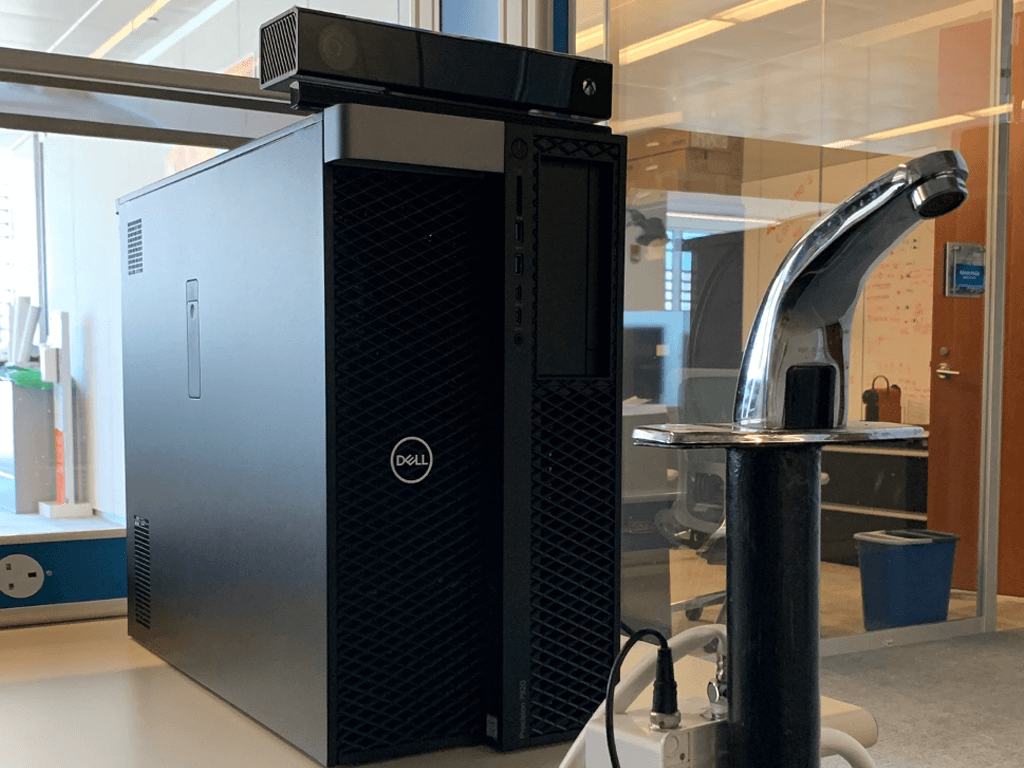KAUST researchers win inaugural MCIT Digital Innovation Award

KAUST researchers who won first place in the Digital Research track at the inaugural Digital Innovation Award, (from left to right) Hui Chen, Lucas Câmara Dantas Bezerra, Abdulwahab Felemban, Mohanad Ahmed, Dr. Ahmed Bader and Safwan .H Ibrahim. Photo courtesy: Taruna Reddy Rapaka
A team of KAUST researchers won first place in the Digital Research track at the inaugural Digital Innovation Awards held on Sunday, April 25, 2021. Launched by the Ministry of Communications and Information Technology (MCIT), the awards aim to "enhance the culture of innovation and entrepreneurship in digital research and development" in Saudi Arabia.
The researchers received the award for their AI-driven water tap, Smart-Tap. The eco-friendly faucet runs a personalized water flow and pressure profile based on each individual's actions in order to cut down on the water waste encountered with traditional and infrared (IR) taps. KAUST MSc./Ph.D. student Abdulwahab Felemban led the team, consisting of researchers from the KAUST Information System Lab (ISL).
Video demonstrates the autonomous Smart-Tap technology, developed in the Information System Lab at KAUST, that uses AI predictive models to efficiently control water usage.
Felemban and his ISL colleagues believe their invention has the potential to revolutionize how we approach future water use globally. The Smart-Tap's genesis was inspired by Wudu: the ritual cleansing of body parts performed by Muslims before prayer.
"During Wudu, vast amounts of water are wasted during the ritual. Water goes directly from the tap into the sink, untouched," Felembian said. "While some IR taps address this issue, they are still inconvenient, and lag a lot when turned on and off."
The team proposed Smart-Tap, a first-of-its-kind tap that uses artificial intelligence to understand and predict human actions and operate in the most efficient way. Felembian said the device can reduce water waste by up to 43% compared to IR taps.

Smart-Tap prototype. Photo credit: KAUST
With the Smart-Tap device, Felemban is hopeful that the group's research output will help support Saudi Arabia's National Water Strategy 2030 in its aim to have a fully functioning sustainable water sector in the not-too-distant future.
"We believe there is room in the market for better products such as Smart-Tap, a product that leverages state-of-the-art technologies to enhance the human experience while being friendly to the environment. This project jump-started thanks to a grant from the Impact Acceleration Fund at KAUST," Professor Tareq Al-Naffouri, principal investigator of the ISL, concluded.
The Smart-Tap team
Nine researchers comprise the KAUST Smart-Tap team:
- Research specialist Mohanad Ahmed provided hardware development for the Smart-Tap prototype. He is affiliated with numerous KAUST teams, including the KAUST Information System Lab (ISL) and Future Cities and Robotics (FCR).
- Master's student Mamdouh Aljoud provided data analysis support for the project and works in the KAUST ISL as well as the Robotics, Intelligent Systems, and Control Lab (RISC).
- Tareq Al-Naffouri, professor of electrical and computer engineering and head of the KAUST ISL, provided overarching supervision and guidance throughout the project.
- Postdoctoral Research Fellow Ahmed Bader specializes in start-up business applications, and served as a Smart-Tap project and research advisor. He is affiliated with Communication Theory Lab (CTL).
- Master's student Lucas Câmara Dantas Bezerra provided technical support and AI development. In addition to his work in the KAUST ISL, he is affiliated with RISC.
- Hui Chen, Ph.D. student of electrical and computer engineering, developed scripts to interact with and operate the Smart-Tap sensors and mechanical valve.
- Master's student Abdulwahab Felemban served as team leader and lead representative at the Digital Innovation Awards. He works in RISC, and developed the AI algorithms used to anticipate human actions and control the tap in real-time.
- Master's student Safwan Ibrahim provided business and entrepreneurial support. He is affiliated with both KAUST ISL and RISC.
- Mudassir Masood specializes in the technical aspects of AI algorithms and served as a project and research advisor. He currently teaches at King Fahd University of Petroleum and Minerals in Dhahran, Saudi Arabia.

